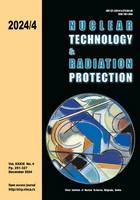
RADIOLOGICAL CHARACTERIZATION OF ALKALI-ACTIVATED MATERIAL DOPED WITH Sm2O3 AND ITS POLYMERIZATION PRODUCTS

Vol.
XXXIX, No. 4, Pp. 251-327
December 2024
UDC 621.039+614.876:504.06
ISSN 1451-3994
Pages: 280-290
Authors: Sanja V. Knežević, Marija M. Ivanović, Snežana S. Nenadović, Milica M. Rajačić, Marijan Nečemer, Jelena Potočnik, and Miloš T. NenadovićAbstract
This article focuses on the in-situ calibration of area radiation monitors by examining changes in The aim of this study was determination of radiological characterization of alkali-activated material with Sm2O3 and its polymerization products. Alkali-activated materials with 1 wt.% and 5 wt.% addition of Sm2O3 were synthesized and their natural radioactivity was determined. Energy dispersive X-ray fluorescence showed changes in the phase composition, or the formation of stable compounds, at higher temperatures. All samples demonstrated good pozzolanic activity, while the percentage of Sm2O3 was slightly changed. The X-ray photoelectron spectroscopy confirmed that the obtained material has a very low carbon content making it environmentally friendly, due to its low carbon content. A detailed analysis of the oxygen peak indicates variations in the stoichiometry of the oxides, which may affect the changes of natural radioactivity. Scanning electron microscopy confirmed that with the increase in the temperature of the thermal treatment, the opening of the pores in the alkali-activated material occurs, as well as further propagation of reaction that increased porosity and crystallization. Radiological measurement confirmed that examined alkali-activated material is safe for usage and exploitation. It should be emphasized that the presence of artificial radionuclide cesium
137Cs was not detected.
Key words: alkali-activated material, Sm2O3, gamma-ray spectrometry, energy dispersive X-ray fluorescence, X-ray photoelectron spectroscopy
FULL PAPER IN PDF FORMAT (1,37 MB)